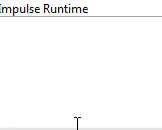x86-64 machine code (Linux system call): 78 bytes
RDTSC spin-loop timing, Linux sys_write system call.
x86-64 doesn't provide a convenient way to query the RDTSC "reference clock" frequency at run time. You can read an MSR (and do a calculation based on that), but that requires kernel mode, or root + opening /dev/cpu/%d/msr, so I decided to make the frequency a build-time constant. (Adjust FREQ_RDTSC as necessary: any 32-bit constant won't change the size of the machine code)
Note that x86 CPUs for several years have had fixed RDTSC frequency so it is usable as a timesource, not a core clock cycle performance counter unless you take steps to disable frequency changes. (There are actual perf counters for counting real CPU cycles.) Usually it ticks at the nominal sticker frequency, e.g. 4.0GHz for my i7-6700k regardless of turbo or powersaving. Anyway, this busy-wait timing doesn't depend on load average (like a calibrated delay-loop would), and also isn't sensitive to CPU power saving.
This code will work for any x86 with a reference frequency below 2^32 Hz, i.e. up to ~4.29 GHz. Beyond that, the low 32 of the timestamp would wrap all the way in 1 second, so I'd have to look at the edx high 32 bits of the result, too.
Summary:
push 00:00:00\n on the stack. Then in a loop:
sys_write system call- ADC-loop over the digits (starting with the last) to increment the time by 1. Wrapping / carry-out handled with a
cmp / cmov, with the CF result providing the carry-in for the next digit.
rdtsc and save the start time.- spin on
rdtsc until the delta is >= ticks per second of the RDTSC frequency.
NASM listing:
1 Address ; mov %1, %2 ; use this macro to copy 64-bit registers in 2 bytes (no REX prefix)
2 Machine code %macro MOVE 2
3 bytes push %2
4 pop %1
5 %endmacro
6
7 ; frequency as a build-time constant because there's no easy way detect it without root + system calls, or kernel mode.
8 FREQ_RDTSC equ 4000000000
9 global _start
10 _start:
11 00000000 6A0A push 0xa ; newline
12 00000002 48BB30303A30303A3030 mov rbx, "00:00:00"
13 0000000C 53 push rbx
14 ; rsp points to `00:00:00\n`
20
21 ; rbp = 0 (Linux process startup. push imm8 / pop is as short as LEA for small constants)
22 ; low byte of rbx = '0'
23 .print:
24 ; edx potentially holds garbage (from rdtsc)
25
26 0000000D 8D4501 lea eax, [rbp+1] ; __NR_write = 1
27 00000010 89C7 mov edi, eax ; fd = 1 = stdout
28 MOVE rsi, rsp
28 00000012 54 <1> push %2
28 00000013 5E <1> pop %1
29 00000014 8D5008 lea edx, [rax-1 + 9] ; len = 9 bytes.
30 00000017 0F05 syscall ; sys_write(1, buf, 9)
31
32 ;; increment counter string: least-significant digits are at high addresses (in printing order)
33 00000019 FD std ; so loop backwards from the end, wrapping each digit manually
34 0000001A 488D7E07 lea rdi, [rsi+7]
35 MOVE rsi, rdi
35 0000001E 57 <1> push %2
35 0000001F 5E <1> pop %1
36
37 ;; edx=9 from the system call
38 00000020 83C2FA add edx, -9 + 3 ; edx=3 and set CF (so the low digit of seconds will be incremented by the carry-in)
39 ;stc
40 .string_increment_60: ; do {
41 00000023 66B93902 mov cx, 0x0200 + '9' ; saves 1 byte vs. ecx.
42 ; cl = '9' = wrap limit for manual carry of low digit. ch = 2 = digit counter
43 .digitpair:
44 00000027 AC lodsb
45 00000028 1400 adc al, 0 ; carry-in = cmp from previous iteration; other instructions preserve CF
46 0000002A 38C1 cmp cl, al ; manual carry-out + wrapping at '9' or '5'
47 0000002C 0F42C3 cmovc eax, ebx ; bl = '0'. 1B shorter than JNC over a MOV al, '0'
48 0000002F AA stosb
49
50 00000030 8D49FC lea ecx, [rcx-4] ; '9' -> '5' for the tens digit, so we wrap at 59
51 00000033 FECD dec ch
52 00000035 75F0 jnz .digitpair
53 ; hours wrap from 59 to 00, so the max count is 59:59:59
54
55 00000037 AC lodsb ; skip the ":" separator
56 00000038 AA stosb ; and increment rdi by storing the byte back again. scasb would clobber CF
57
58 00000039 FFCA dec edx
59 0000003B 75E6 jnz .string_increment_60
60
61 ; busy-wait for 1 second. Note that time spent printing isn't counted, so error accumulates with a bias in one direction
62 0000003D 0F31 rdtsc ; looking only at the 32-bit low halves works as long as RDTSC freq < 2^32 = ~4.29GHz
63 0000003F 89C1 mov ecx, eax ; ecx = start
64 .spinwait:
65 ; pause
66 00000041 0F31 rdtsc ; edx:eax = reference cycles since boot
67 00000043 29C8 sub eax, ecx ; delta = now - start. This may wrap, but now we have the delta ready for a normal compare
68 00000045 3D00286BEE cmp eax, FREQ_RDTSC ; } while(delta < counts_per_second)
69 ; cmp eax, 40 ; fast count to test printing
70 0000004A 72F5 jb .spinwait
71
72 0000004C EBBF jmp .print
next address = 0x4E = size = 78 bytes.
Uncomment the pause instruction to save significant power: this heats one core up by ~15 degrees C without pause, but only by ~9 with pause. (On Skylake, where pause sleeps for ~100 cycles instead of ~5. I think it would save more if rdtsc wasn't also slow-ish so the CPU isn't doing much a lot of the time).
A 32-bit version would be a few bytes shorter, e.g. using a 32-bit version of this to push the initial 00:00:00\n string.
16 ; mov ebx, "00:0"
17 ; push rbx
18 ; bswap ebx
19 ; mov dword [rsp+4], ebx ; in 32-bit mode, mov-imm / push / bswap / push would be 9 bytes vs. 11
And also using 1-byte dec edx. The int 0x80 system call ABI wouldn't use esi / edi, so the register setup for the syscall vs. lodsb / stosb might be simpler.



Note for later challenges, clarification in the comments is a bad thing to do. reference
– user202729 – 2017-12-27T03:56:53.057